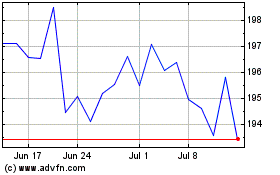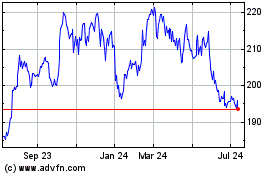UPDATE:CME To Still Block Rival's Trades Despite CFTC Letter
August 16 2010 - 1:32PM
Dow Jones News
CME Group Inc. (CME) on Monday said it would continue to block
trades that would shift contract positions between futures
exchanges after regulators reiterated that such transactions do not
violate federal rules.
The Chicago-based exchange operator maintained that the laws
governing U.S. futures markets permit the company to continue
prohibiting "exchange of futures for futures" transactions.
The debate centers on a type of transaction developed by ELX
Futures LP, a startup New York exchange aimed at drawing trade in
U.S. interest-rate futures away from Chicago-based CME, which holds
a near-monopoly on the business.
ELX's exchange of futures for futures, or EFF, transactions
would let two parties carry out a trade that moves rate futures
positions from CME's clearinghouse to the Options Clearing Corp.,
which handles trading at ELX.
Consortium-backed ELX has argued that the EFF trades would help
investors manage collateral posted against outstanding positions,
but CME has equated them to "wash trades," fictitious transactions
that carry no market risk.
The Commodity Futures Trading Commission on Monday said in a
statement that EFF transactions "are not wash sales and are
consistent with commission precedent," describing CME's analysis of
the issue "erroneous."
A staff review also found that the trades aren't prohibited by
the Commodity Exchange Act or CFTC regulations.
Regulators gave CME 30 days to further justify its rejection of
the trades, furthering a back-and-forth that began in early
2010.
CME said the CFTC's review "does not change CBOT rules, which
clearly prohibit" the EFF transactions.
The exchange operator in a statement vowed to continue
prohibiting EFFs, which would "reduce transparency and price
discovery" in its Treasury futures markets.
After trading lower at the market open, CME shares recently were
up 1.2% at $247.70.
Neal Wolkoff, chief executive of ELX, said in a statement his
company would "vigorously pursue full acceptance of the EFF."
"We cannot think of any reason why the EFF transaction does not
benefit customer and market interests, and believe that the CME
Group is acting solely for its own competitive interests in
opposing the EFF," Wolkoff said Monday.
CME and ELX have jousted for nearly a year over the issue, which
has the potential to transform competition in the sector.
Letting traders migrate contracts from one exchange to another
has been seen as a step toward "fungibility" in U.S. futures
markets, which would permit investors to trade contracts at one
venue and post collateral at another.
Contracts traded at CME must be cleared at its clearinghouse,
boosting the company's pricing power with regard to trading fees.
In U.S. stock and options markets, trades take place across a range
of venues and are cleared at one central repository.
ELX has listed lookalike versions of CME's most popular
interest-rate contracts, including futures tied to Treasury yields
and inter-bank lending rates, but volume remains a tiny fraction of
that done on CME's markets.
The exchange of futures for futures transaction has been seen as
another way for ELX to capture business from CME. CFTC staff noted
Monday that its view on ELX's EFF rule is consistent with its past
approval of a separate but similar function in crude oil markets,
sought by the New York Mercantile Exchange in 2002. Nymex is now
owned by CME.
CME was directed by regulators Monday to justify its rationale
for blocking the ELX transactions while allowing similar
transactions to occur in other markets, and to estimate how much
interest the EFF transactions might generate among traders.
-By Jacob Bunge, Dow Jones Newswires; (312) 750 4117;
jacob.bunge@dowjones.com
(Nathan Becker contributed to this article.)
CME (NASDAQ:CME)
Historical Stock Chart
From Jun 2024 to Jul 2024

CME (NASDAQ:CME)
Historical Stock Chart
From Jul 2023 to Jul 2024
